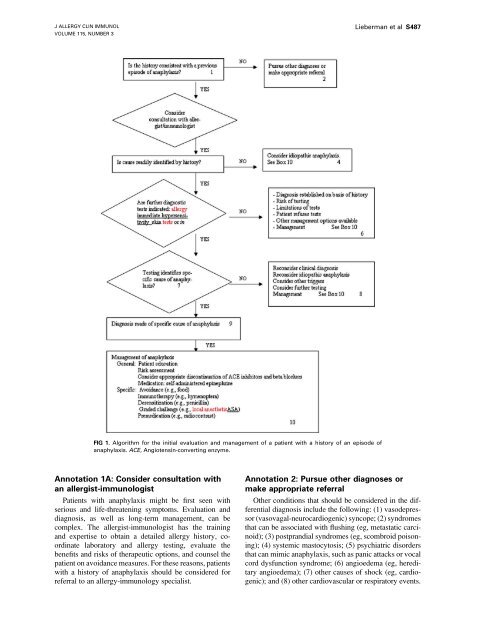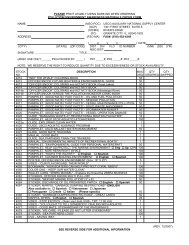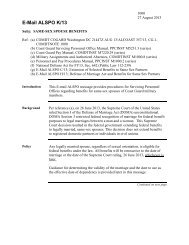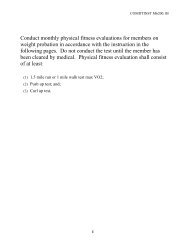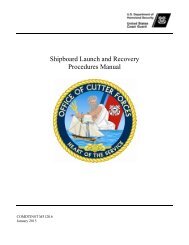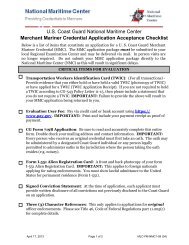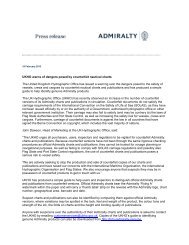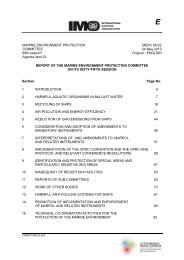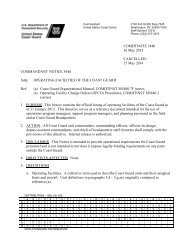- Page 1 and 2:
Immunotherapy Safety for the Primar
- Page 3 and 4:
Welcome to “Immunotherapy Safety
- Page 5 and 6:
Click the ⌧ next to the topic to
- Page 7 and 8:
Immunotherapy at Remote Sites Stand
- Page 9 and 10:
What Immunotherapy Is Not • Not p
- Page 11 and 12:
How Does Immunotherapy Work? • De
- Page 13 and 14:
Who Benefits? •Those with… - Al
- Page 15 and 16:
Immunotherapy Efficacy • Effectiv
- Page 17 and 18:
Not Efficacious For… • Atopic d
- Page 19 and 20:
The Extracts/Vaccines • Bioequiva
- Page 21 and 22:
Lots of Numbers! Vial v/v W/V (exam
- Page 23 and 24:
Immunotherapy Phases • Maintenanc
- Page 25 and 26:
Reaction Prevention - Avoidance •
- Page 27 and 28:
Reaction Therapy - BLS+ Level • T
- Page 29 and 30:
Treatment Guidelines • Treatment
- Page 31 and 32:
Frequency of Systemic Reactions •
- Page 33 and 34:
Immunotherapy Safety • To lessen
- Page 35 and 36:
Immunotherapy Safety • To lessen
- Page 37 and 38:
Immunotherapy Safety • After Inje
- Page 39 and 40:
Immunotherapy Safety • Equipment:
- Page 41 and 42:
What To Expect (Demand) from the Al
- Page 43 and 44:
Summary • Risk factors for advers
- Page 45:
End of Selection Go to Bookmarks &
- Page 48 and 49:
• Allergen immunotherapy (allergy
- Page 50 and 51:
BEFORE EACH SHOT!!! • Screen pati
- Page 52 and 53:
instruct patient to report any abno
- Page 54 and 55:
• Negative (swelling up to 15mm;
- Page 56 and 57:
Epi-Pen Adult Epi-Pen JR TwinJect
- Page 58 and 59:
How to dilute from available vials:
- Page 60 and 61:
Vial v/v W/V AU/ML BAU/ML 5 Red 4 G
- Page 62 and 63:
Summary • Pull the patient's alle
- Page 64 and 65:
End of Selection Go to Bookmarks &
- Page 66 and 67:
a. Medical conditions that reduce t
- Page 68 and 69:
Allergen immunotherapy should be gi
- Page 70 and 71:
patient’s peak expiratory flow ra
- Page 72 and 73:
7. Neilson L, Johnsen C, Mosbech H,
- Page 74 and 75:
Click the ⌧ next to the heading t
- Page 76 and 77:
a common practice to alternate the
- Page 78 and 79:
ALLERGY IMMUNOTHERAPY (AIT) PROBLEM
- Page 80 and 81:
End of Selection Go to Bookmarks &
- Page 82 and 83:
10. Those patients having their dos
- Page 84 and 85:
SPECIFIC INSTRUCTIONS A. PHYSICIAN
- Page 86 and 87:
ALLERGY IMMUNOTHERAPY RECORD NNMC,
- Page 88 and 89:
Immunotherapy Pre-Injection Questio
- Page 90 and 91:
Aeroallergen Dose Adjustment Schedu
- Page 92 and 93:
NATIONAL NAVAL MEDICAL CENTER: Alle
- Page 94 and 95:
ONGOING COMPETENCY ASSESSMENT OF UN
- Page 96 and 97:
End of Selection Go to Bookmarks &
- Page 98 and 99:
eflecting current robust documentat
- Page 100 and 101:
Allergen immunotherapy: A practice
- Page 102 and 103:
J ALLERGY CLIN IMMUNOL VOLUME 120,
- Page 104 and 105:
J ALLERGY CLIN IMMUNOL VOLUME 120,
- Page 106 and 107:
J ALLERGY CLIN IMMUNOL VOLUME 120,
- Page 108 and 109:
J ALLERGY CLIN IMMUNOL VOLUME 120,
- Page 110 and 111:
J ALLERGY CLIN IMMUNOL VOLUME 120,
- Page 112 and 113:
J ALLERGY CLIN IMMUNOL VOLUME 120,
- Page 114 and 115:
J ALLERGY CLIN IMMUNOL VOLUME 120,
- Page 116 and 117:
J ALLERGY CLIN IMMUNOL VOLUME 120,
- Page 118 and 119:
J ALLERGY CLIN IMMUNOL VOLUME 120,
- Page 120 and 121:
J ALLERGY CLIN IMMUNOL VOLUME 120,
- Page 122 and 123:
J ALLERGY CLIN IMMUNOL VOLUME 120,
- Page 124 and 125:
J ALLERGY CLIN IMMUNOL VOLUME 120,
- Page 126 and 127:
J ALLERGY CLIN IMMUNOL VOLUME 120,
- Page 128 and 129:
J ALLERGY CLIN IMMUNOL VOLUME 120,
- Page 130 and 131:
J ALLERGY CLIN IMMUNOL VOLUME 120,
- Page 132 and 133:
J ALLERGY CLIN IMMUNOL VOLUME 120,
- Page 134 and 135:
J ALLERGY CLIN IMMUNOL VOLUME 120,
- Page 136 and 137:
J ALLERGY CLIN IMMUNOL VOLUME 120,
- Page 138 and 139:
J ALLERGY CLIN IMMUNOL VOLUME 120,
- Page 140 and 141:
J ALLERGY CLIN IMMUNOL VOLUME 120,
- Page 142 and 143:
J ALLERGY CLIN IMMUNOL VOLUME 120,
- Page 144 and 145:
J ALLERGY CLIN IMMUNOL VOLUME 120,
- Page 146 and 147:
J ALLERGY CLIN IMMUNOL VOLUME 120,
- Page 148 and 149:
J ALLERGY CLIN IMMUNOL VOLUME 120,
- Page 150 and 151:
J ALLERGY CLIN IMMUNOL VOLUME 120,
- Page 152 and 153:
J ALLERGY CLIN IMMUNOL VOLUME 120,
- Page 154 and 155:
J ALLERGY CLIN IMMUNOL VOLUME 120,
- Page 156 and 157:
J ALLERGY CLIN IMMUNOL VOLUME 120,
- Page 158 and 159:
J ALLERGY CLIN IMMUNOL VOLUME 120,
- Page 160 and 161:
J ALLERGY CLIN IMMUNOL VOLUME 120,
- Page 162 and 163:
Immunotherapy Safety for the Primar
- Page 164 and 165:
15. A 12 yo male presents for his a
- Page 166 and 167:
Immunotherapy Safety for the Primar
- Page 168 and 169:
Site Under Construction
- Page 170 and 171:
Introduction • “Anaphylaxis”
- Page 172 and 173:
Revised Nomenclature For Anaphylaxi
- Page 174 and 175:
Anaphylaxis* Is Not Rare Estimated
- Page 176 and 177:
Pathophysiology
- Page 178 and 179: Pathophysiology
- Page 180 and 181: Pathophysiology • Histamine acts
- Page 182 and 183: IgE Mediated Reactions • Most Ant
- Page 184 and 185: Complement-mediated • C5a, C3a, C
- Page 186 and 187: Unknown Mechanisms • Exercise-ind
- Page 188 and 189: Anaphylaxis Summary of Signs & Symp
- Page 190 and 191: Differential Diagnosis • Pulmonar
- Page 192 and 193: Anaphylaxis Grading Scale II • An
- Page 194 and 195: Laboratory Studies • IgE antibodi
- Page 196 and 197: Guidelines for Treatment • Treatm
- Page 198 and 199: Guidelines for Treatment • Treatm
- Page 200 and 201: How the Allergist/Immunologist Can
- Page 202 and 203: Summary • Anaphylaxis: release of
- Page 204 and 205: ANAPHYLAXIS • First reported case
- Page 206 and 207: 4) Hymenoptera stings Although almo
- Page 208 and 209: • Sulfites are added to all the b
- Page 210 and 211: mastocytosis on bone marrow biopsy.
- Page 212 and 213: Antihistamines H1 antihistamines (B
- Page 214: End of Selection Go to Bookmarks &
- Page 224 and 225: The diagnosis and management of ana
- Page 226 and 227: J ALLERGY CLIN IMMUNOL VOLUME 115,
- Page 230 and 231: J ALLERGY CLIN IMMUNOL VOLUME 115,
- Page 232 and 233: J ALLERGY CLIN IMMUNOL VOLUME 115,
- Page 234 and 235: J ALLERGY CLIN IMMUNOL VOLUME 115,
- Page 236 and 237: J ALLERGY CLIN IMMUNOL VOLUME 115,
- Page 238 and 239: J ALLERGY CLIN IMMUNOL VOLUME 115,
- Page 240 and 241: J ALLERGY CLIN IMMUNOL VOLUME 115,
- Page 242 and 243: J ALLERGY CLIN IMMUNOL VOLUME 115,
- Page 244 and 245: J ALLERGY CLIN IMMUNOL VOLUME 115,
- Page 246 and 247: J ALLERGY CLIN IMMUNOL VOLUME 115,
- Page 248 and 249: J ALLERGY CLIN IMMUNOL VOLUME 115,
- Page 250 and 251: J ALLERGY CLIN IMMUNOL VOLUME 115,
- Page 252 and 253: J ALLERGY CLIN IMMUNOL VOLUME 115,
- Page 254 and 255: J ALLERGY CLIN IMMUNOL VOLUME 115,
- Page 256 and 257: J ALLERGY CLIN IMMUNOL VOLUME 115,
- Page 258 and 259: J ALLERGY CLIN IMMUNOL VOLUME 115,
- Page 260 and 261: J ALLERGY CLIN IMMUNOL VOLUME 115,
- Page 262 and 263: J ALLERGY CLIN IMMUNOL VOLUME 115,
- Page 264 and 265: J ALLERGY CLIN IMMUNOL VOLUME 115,
- Page 267 and 268: End of Selection Go to Bookmarks &
- Page 269 and 270: c. The patient will be counseled co
- Page 271 and 272: End of Selection Go to Bookmarks &
- Page 273 and 274: skin testing typically is performed
- Page 275 and 276: TABLE 3 Required Information on Vac
- Page 277 and 278: TABLE 6 Checklist for Safe Vaccine
- Page 279 and 280:
Strength of Recommendations Key cli
- Page 281 and 282:
Original articles Evaluation of nea
- Page 283 and 284:
J ALLERGY CLIN IMMUNOL VOLUME 117,
- Page 285 and 286:
J ALLERGY CLIN IMMUNOL VOLUME 117,
- Page 287 and 288:
J ALLERGY CLIN IMMUNOL VOLUME 117,
- Page 289 and 290:
Allergy Treatment Record Review Cha
- Page 291 and 292:
References Acknowledgment: Linda Co


